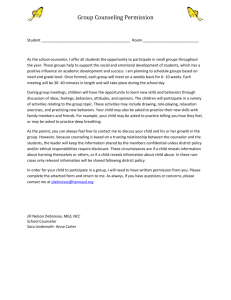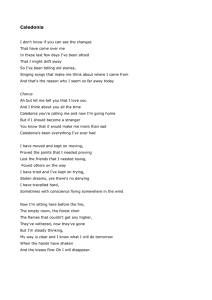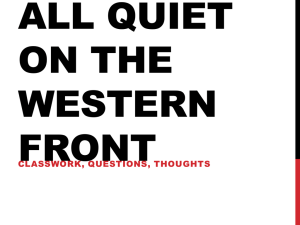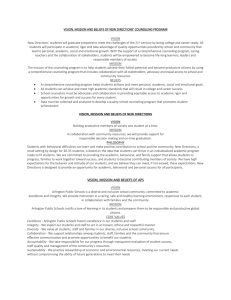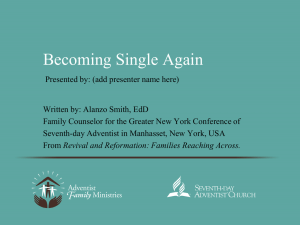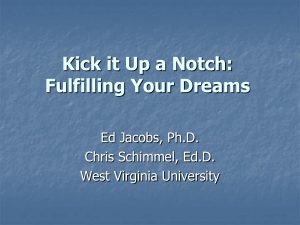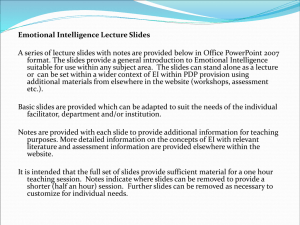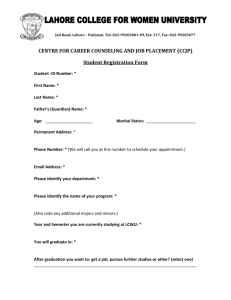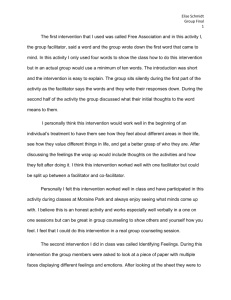View Seminar Outline - Caledonia Counseling
advertisement
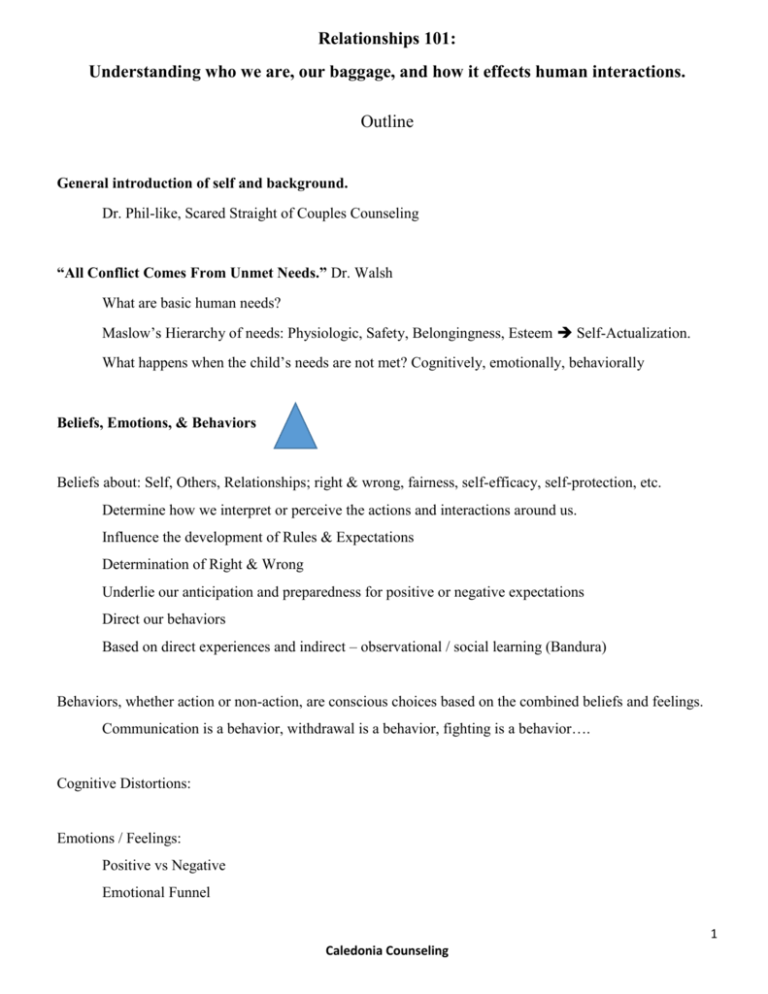
Relationships 101: Understanding who we are, our baggage, and how it effects human interactions. Outline General introduction of self and background. Dr. Phil-like, Scared Straight of Couples Counseling “All Conflict Comes From Unmet Needs.” Dr. Walsh What are basic human needs? Maslow’s Hierarchy of needs: Physiologic, Safety, Belongingness, Esteem Self-Actualization. What happens when the child’s needs are not met? Cognitively, emotionally, behaviorally Beliefs, Emotions, & Behaviors Beliefs about: Self, Others, Relationships; right & wrong, fairness, self-efficacy, self-protection, etc. Determine how we interpret or perceive the actions and interactions around us. Influence the development of Rules & Expectations Determination of Right & Wrong Underlie our anticipation and preparedness for positive or negative expectations Direct our behaviors Based on direct experiences and indirect – observational / social learning (Bandura) Behaviors, whether action or non-action, are conscious choices based on the combined beliefs and feelings. Communication is a behavior, withdrawal is a behavior, fighting is a behavior…. Cognitive Distortions: Emotions / Feelings: Positive vs Negative Emotional Funnel 1 Caledonia Counseling Relationships 101: Understanding who we are, our baggage, and how it effects human interactions. Expectations of marriage & relationships. Expectations of sex roles and responsibilities: who works, division of labor at home, childcare, decision making, Expectations over financial issues: priorities of spending & saving, purpose of money, necessities vs desires, etc. Expectations of how children should behave: their responsibilities, communicate, perform in school, perform in sports or extracurricular activities. Expectations of parent – child relationships: Levels of authority and decision making, attachment levels and dynamics, appropriate behaviors with children, dependence & independence, capabilities, etc. Expectations of discipline methods: spanking vs time out, purpose of punishment, intensity, etc. Family of Origin – what are your roots & how do they influence you? Cultural influences: deeply embedded rules of everything based on ethnic and regional expectations, cultural differences by generation, within marriages, due to immigration / emigration, etc. Parental similarities and differences: discord and conflicts – role modeling on how to handle differences. Parental addictions Sibling relationships Neighborhood / school cultures IMAGO Mental assignment – take the next 10 minutes to think about the areas where you grew up, school experiences, peers, your friends, etc. Did you move a lot? Stay in the same place? Family financial picture? Describe your room and your home. IMAGO worksheets. We are the most reactive to situations, words and actions of others that trigger our internal pains. We create specific thoughts (BELIEFS) and decisions based on these childhood issues and experiences that are intended to compensate or correct for those issues. Or we decide that there is nothing that can be done and passively accept these fates and therefore allow them to occur again later in our lives. 2 Caledonia Counseling Relationships 101: Understanding who we are, our baggage, and how it effects human interactions. Emotions & Feelings: What is the difference between emotions and feelings? What does it mean to be triggered? What are hidden feelings? Emotional Iceberg Personality Styles: Nature vs. Nurture: What does this mean? Role of genetics and the diathesis – stress model. Passive vs Aggressive, differences and similarities What is passive-aggressive? Mask & Shadow WE TEACH PEOPLE HOW TO TREAT US!!! Relationships are an exchange of emotional energy Every action we take, everything we say has an intended purpose and goal. Situations and the actions of others get us triggered when they violate our beliefs (i.e. expectations, rules) or support a negative expectation or belief. How do you respond (energy exchange) to conflict issues? Immediately? Withdraw in silence? Hit and run? Never? Gottman’s Conflict Styles: How we do conflict usually makes it worse and nothing effective is communicated. Levenson: Time Limited Dynamic Psychotherapy – CMP Theories of Change: Stages of Change CBT Transactional Analysis Psychodynamic Family Systems 3 Caledonia Counseling Relationships 101: Understanding who we are, our baggage, and how it effects human interactions. COMMUNICATION IS THE KEY TO HEALTHY RELATIONSHIPS!!! But what? I thought I was communicating…. Barriers to Effective Communication; how does this fit with conflict style? Gottman’s 4 Horsemen What to Communicate – remember grade school grammar -who, what, where, why, when, and how? Back to the Emotional Iceberg and our triggers… I Feel Statements… Paraphrasing and reflective listening Turn complaints into requests Gender Differences ABCs of Sensible Thinking Use of Time Out What is Empathy? Healthy Characteristics: Individuals and Relationships Gottman’s Sound Marital House Questionnaires What is necessary to build strong relationship foundations? How to measure these… Rules for Fair Fighting Parenting Styles and Child Development & Attachment THE DARK SIDE: Statistics on DV, effects on children, addictions, etc. 4 Caledonia Counseling
